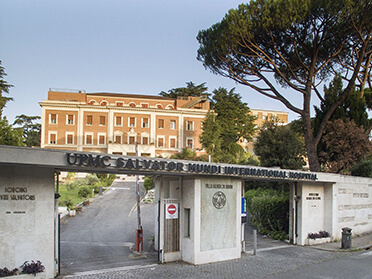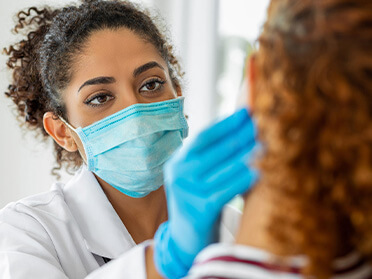Pediatrics at UPMC Salvator Mundi International Hospital
UPMC Salvator Mundi International Hospital offers a pediatric service for diagnosis, study, and treatment (also surgical, when required) of pediatric diseases.
Children require targeted and sensitive care: at our Center we understand their unique health care needs and make sure that visits, hospital stay, and plan of care are as least traumatic as possible for our young patients. The safety and wellbeing of children are our priority, and we take all necessary precautions to ensure they receive adequate and comfortable care.
Pediatric Services
We offer specialized care in numerous pediatric specialties:
- Allergology.
- Dermatology.
- Dietetics.
- Ophthalmology.
- Orthopedics.
- Otolaryngology.
- Pulmonology.
- Urology.
Some diseases result from congenital malformations or issues present from birth, others may occur during early childhood or develop later.
Allergy
Pediatric allergology issues can manifest with a variety of symptoms:
- Respiratory: chronic or recurrent rhinitis, rhinoconjunctivitis, bronchial asthma, laryngospasm, persistent cough.
- Cutaneous: atopic dermatitis, urticaria, angioedema.
- Gastro-intestinal: chronic diarrhea, obstinate constipation, oral allergy syndrome.
- Systemic: anaphylaxis, angioedema.
- Other symptomatology due, for example, to recurrent otitis or conjunctivitis.
At our facility, you can find teams of experts who specialize in the following services:
- Diagnostic framing through a thorough family and personal medical history, which may include skin allergy tests (Skin Prick Test) for environmental and food allergens, patch test for nickel allergy, or prescription of additional hematochemical investigations.
- Setting of drug therapies and specific sublingual hyposensitizing therapies with environmental allergens, for the treatment of bronchial asthma, rhinitis and allergic rhinoconjunctivitis.
Pediatricians specializing in allergology at UPMC Salvator Mundi International Hospital:
Dermatology
At UPMC Salvator Mundi International Hospital we treat various skin conditions that can occur in infants and children:
- Transient dermatoses. A careful clinical examination of the skin lesions of the infant and child allows us to determine whether the dermatosis is related to the physiological maturation of the skin and can resolve spontaneously.
- Infections and genodermatosis. Some skin signs may indicate local or systemic infections or be symptoms of genodermatosis, a genetic skin disease, requiring a specialist approach to rule out urgencies.
- Skin tumors. Although rare, malignant skin tumors can appear in children, making periodic checkups appropriate, especially in the presence of numerous moles.
Our teams are, in addition, specialized in the treatment of:
- Atopic dermatitis.
- Diaper dermatitis.
- Childhood acne.
- Childhood eczema.
- Angioedema.
- Psoriasis.
- Irritative dermatitis.
- Tinea.
- Alopecia.
- Impetigo.
- Other infectious dermatoses, such as hand-foot-mouth.
Pediatricians specializing in dermatology at UPMC Salvator Mundi International Hospital:
Dietetics
At our facility, we offer pediatric dietology services for patients with the following conditions:
- Excess weight: overweight or simple, severe and severe obesity.
- Obesity complicated by other factors such as hyperinsulinism, hepatic steatosis, thyropathy.
- Weight deficit.
- Eating behavior disorders such as food selectivity and anorexia.
- Hypercholesterolemia and/or hypertriglyceridemia.
Our specialists perform:
- Dietary examination including:
- Accurate personal and family history
- Nutritional assessment
- Prescription for a metabolic investigation.
- Setting of a personalized dietary program.
Pediatric specialist in dietetics at UPMC Salvator Mundi International Hospital:
Pediatric Ophthalmology
Correcting vision system disorders is especially crucial in the early years of life, as the eye system is still developing. Accurate and early diagnosis is essential to ensure a complete resolution of a disease. Early detection and treatment of vision problems in children can help prevent future complications and allow them to develop a normal, healthy vision.
Some of the most common pediatric vision disorders:
- Amblyopia. A vision condition, usually reversible, in which the visual function of one eye is reduced or absent.
- Strabismus. A condition present from birth in which the eyes are out of line relative to one another.
- Congenital ptosis. A condition that affects the levator muscle of the upper eyelid. Its lack of development during embryonic life prevents the normal opening of the eye.
- Retinoblastoma. A malignant ocular tumor that affects the retina and is caused by a genetic mutation.
Pediatric Ophthalmologists at UPMC Salvator Mundi International Hospital:
Orthopaedics
Pediatric orthopedic conditions may be present from birth, develop during growth, or be the result of trauma. At our facility, the child is received in a familiar environment to minimize possible trauma related to the situation. Our team can follow the entire course of care from diagnosis through treatment, including surgical where necessary, to rehabilitation and full recovery.
Our teams specialize in the treatment of:
- Developmental orthopaedic diseases.
- Perthes disease.
- Hip disorders such as epiphysiolysis of the hip, and congenital hip dysplasia.
- Congenital clubfoot.
- Flat feet.
- Axial deviations.
- Ankle disorders.
- Patella disorders.
- Fractures and dislocations of the upper and lower limbs.
- Benign tumors and pseudotumors.
- Sports injuries and trauma.
Pediatric orthopaedic specialists at UPMC Salvator Mundi International Hospital:
Otolaryngology
Pediatric otolaryngology is a branch of medicine dedicated to the diagnosis and treatment of diseases of the ear, nose, and throat in children.
The main problems addressed include:
- middle ear infections, such as otitis media.
- nasal obstructions, enlarged adenoids.
- recurrent tonsillitis.
The most common interventions include:
- surgical removal of adenoids and tonsils.
- surgical correction of ear defects.
- airway adjustment to improve breathing.
Our experts' multidisciplinary approach ensures personalized care and effective solutions to improve children's health and well-being.
Otolaryngologists at UPMC Salvator Mundi International Hospital.
Pneumology
At our facility we treat the main respiratory diseases, both acute and chronic, of pediatric age:
- Bronchial asthma, treated by the pulmonologist in team with the allergist.
- Laryngospasm.
- Persistent cough.
- Recurrent lower respiratory tract infections.
- Sleep breathing disorders: due to sleep apnea, neurological problems, enlarged tonsils or adenoids, altered structure of the facial massif. They are treated by the pediatric pulmonologist as a team with the otolaryngologist and allergist.
In cases of chronic and rare diseases, such as cystic fibrosis or pulmonary emphysema, the pediatric pulmonologist will be able to make an initial diagnostic framing.
We perform the following services:
- Spirometry with bronchodilation from the age of 6 years: it is advisable to perform it annually in diagnosed cases of asthma.
- Pediatric pulmonology examination.
Pediatricians specializing in pulmonology at UPMC Salvator Mundi International Hospital:
Urology
Detecting and treating pediatric urologic disorders is crucial to prevent possible repercussions on urogenital function and reduce the risk of compromising future fertility. Many urologic disorders can be successfully treated if detected early and managed appropriately.
Pediatric urology surgeries are often performed on an outpatient basis, with the collaboration of anesthesiologists specializing in pediatrics.
Major pediatric urogenital disorders include:
- Hypospadias, one of the most common congenital anomalies of the penis. In patients who suffer from it, the outlet of the urethra is not located at the apex of the glans but is located on the ventral face of the penis or, in severe cases, in the scrotum or perineum. This makes erect urination impossible and, in adults, results in painful erection. It requires surgical treatment.
- Cryptorchidism, which occurs when the descent of one or both testicles is either incomplete or missed. Surgery, which involves a small incision at the inguinal level, is resolving and short-lived, allowing the patient to be discharged a few hours later.
- Inguinal hernia, one of the most common surgical conditions in childhood. It is found in 3 to 4% of the child population and more frequently in boys. It is a congenital condition, which becomes evident during childhood as a result of exertion or daily activities.
- Phimosis, a condition characterized by the inability of the foreskin to slide over the glans. In infants, it is so common that it is considered physiological and tends to resolve spontaneously as they grow. Treatment is surgical and can be performed with different approaches on an outpatient surgery basis.
- Hydrocele and funiculus cyst, an eversion of the peritoneum that covers the inside of the abdominal cavity. In the male, it accompanies the testis on its descent to the scrotum, while in the female it accompanies the round ligament of the uterus to the labia majora. This structure disappears naturally during the first few months of life, otherwise surgical intervention is required.
- Varicocele: a condition affecting the male genitals, characterized by dilation of the veins within the scrotal bursa, which carries venous blood from the testis to the heart, dilation caused by loss of function of the valves present in the internal spermatic vein. It involves the increase in volume of the corresponding scrotum and may initially appear as a small bluish spot at the top of the scrotum. Diagnosis is based on clinical evaluation and may be associated with echo-color-doppler. Treatment, to preserve fertility as an adult, may be by sclerotherapy or surgery, or by mixed technique.
- Cysts, fistulas, umbilical hernia.
- Functional disorders of the urinary tract, such as enuresis, unstable bladder, and neurologic bladder.
- Complex anomalies of the kidney and urinary tract, including vesicoureteral reflux, primary and secondary megaureter, stenosis of the pyelo-ureteral junction.
Pediatric urologist at UPMC Salvator Mundi International Hospital:
Pediatric Specialists at UPMC Salvator Mundi International Hospital
- Dr. Mariano Barbalace
- Dr. Annalisa Clementi
- Prof. Pietro Costa
- Dr. Vincenzo Fierimonte
- Prof. G. Antonio Marrocco
- Dr. Francesca Mazza
- Dr. Patricia Moran Alvarez
- Dr. Rita Wietrzykowska Sforza
Pediatrics at UPMC

We offer medical services and services on a private basis or in agreement with the main insurance companies. Some of our services are also affiliated with the National Health System.
For more information on active agreements, visit:

